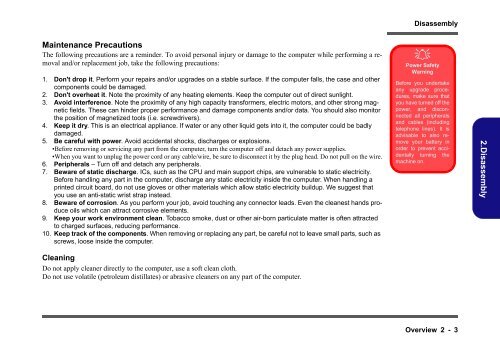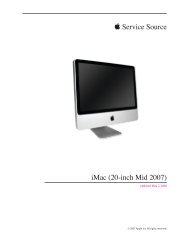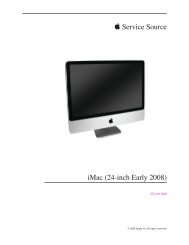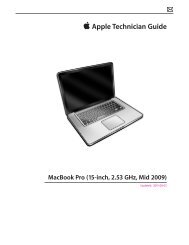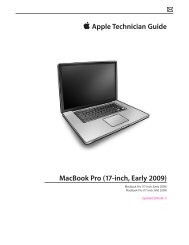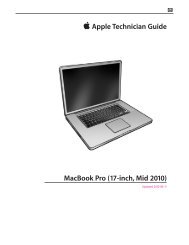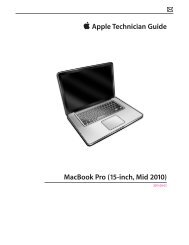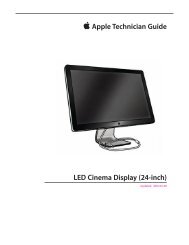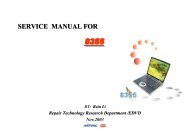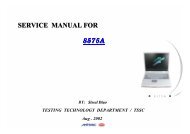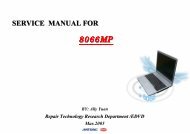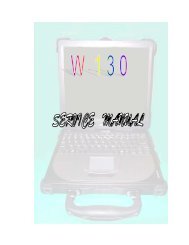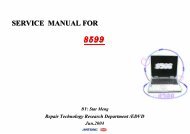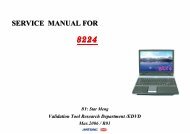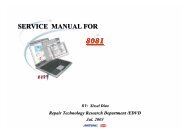You also want an ePaper? Increase the reach of your titles
YUMPU automatically turns print PDFs into web optimized ePapers that Google loves.
Maintenance Prec<strong>au</strong>tions<br />
The following prec<strong>au</strong>tions are a reminder. To avo<strong>id</strong> personal injury or damage to the computer while performing a removal<br />
and/or replacement job, take the following prec<strong>au</strong>tions:<br />
1. Don't drop it. Perform your repairs and/or upgrades on a stable surface. If the computer falls, the case and other<br />
components could be damaged.<br />
2. Don't overheat it. Note the proximity of any heating elements. Keep the computer out of direct sunlight.<br />
3. Avo<strong>id</strong> interference. Note the proximity of any high capacity transformers, electric motors, and other strong magnetic<br />
fields. These can hinder proper performance and damage components and/or data. You should also monitor<br />
the position of magnetized tools (i.e. screwdrivers).<br />
4. Keep it dry. This is an electrical appliance. If water or any other liqu<strong>id</strong> gets into it, the computer could be badly<br />
damaged.<br />
5. Be careful with power. Avo<strong>id</strong> acc<strong>id</strong>ental shocks, discharges or explosions.<br />
•Before removing or servicing any part from the computer, turn the computer off and detach any power supplies.<br />
•When you want to unplug the power cord or any cable/wire, be sure to disconnect it by the plug head. Do not pull on the wire.<br />
6. Peripherals – Turn off and detach any peripherals.<br />
7. Beware of static discharge. ICs, such as the CPU and main support chips, are vulnerable to static electricity.<br />
Before handling any part in the computer, discharge any static electricity ins<strong>id</strong>e the computer. When handling a<br />
printed circuit board, do not use gloves or other materials which allow static electricity buildup. We suggest that<br />
you use an anti-static wrist strap instead.<br />
8. Beware of corrosion. As you perform your job, avo<strong>id</strong> touching any connector leads. Even the cleanest hands produce<br />
oils which can attract corrosive elements.<br />
9. Keep your work environment clean. Tobacco smoke, dust or other air-born particulate matter is often attracted<br />
to charged surfaces, reducing performance.<br />
10. Keep track of the components. When removing or replacing any part, be careful not to leave small parts, such as<br />
screws, loose ins<strong>id</strong>e the computer.<br />
Cleaning<br />
Do not apply cleaner directly to the computer, use a soft clean cloth.<br />
Do not use volatile (petroleum distillates) or abrasive cleaners on any part of the computer.<br />
Disassembly<br />
�<br />
Power Safety<br />
Warning<br />
Before you undertake<br />
any upgrade procedures,<br />
make sure that<br />
you have turned off the<br />
power, and disconnected<br />
all peripherals<br />
and cables (including<br />
telephone lines). It is<br />
advisable to also remove<br />
your battery in<br />
order to prevent acc<strong>id</strong>entally<br />
turning the<br />
machine on.<br />
Overview 2 - 3<br />
2.Disassembly


